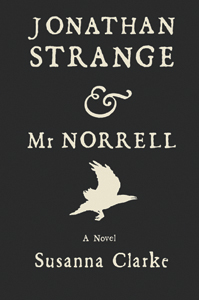"Two magicians shall appear in England.
The first shall fear me.
The second shall long to behold me."
It is a device of the novelist to depict the world of which they write as the authentic one. Fiction enjoys pretending it is fact " that's part of the fun of writing and reading. And the writer's ability to make you an inhabitant of that world " albeit temporarily " is down to their agility with language and the strength of their story.

In her epic novel, Jonathan Strange and Mr Norrell, English writer Susanna Clarke has recreated England in the early 19th century. Echoing the literary styles of Jane Austen and George Eliot, Susanna Clarke reconstructs England with her thorough and engaging prose. But more than that she reimagines English history, or creates an alternate history where magic is a fundamental part of existence.
Weaving real characters and events into the fiction Clarke has made an astonishingly erudite work. Her research and flights of imagination persuade the reader to throw off disbelief and enter her hybrid historical world.
Clarke's magic is not that of wizards and witches. It is very much a gentleman's affair. Magicians are typically fusty academic types whose dabbling in magic is purely theoretical. None of them actually do magic.
But it was not always so. Centuries ago lived a mysterious figure known as the Raven King. Raised by fairies " who are a species of creature to be feared " the Raven King was a human child who wrought incredible feats of magic. However as his era passed his life became legend and magic became a matter purely for squabbling old men.
That is until the dour and secretive Mr Norrell enters the story. After lying dormant for hundreds of years practical magic reawakens and Mr Norrell heads to London to offer his service to the government.
His ambition to be the sole English magician is thwarted by the arrival of the gregarious and talented Jonathan Strange. Strange becomes Norrell's student and together they take a key role in defeating the relentless Napoleon.
But Strange is not content to remain under the cautious control of Norrell. With diverse views on the practice of magic and the Raven King Norrell and Strange part ways becoming strident rivals.
Magic in literature has been a problematic subject for Christians. The Bible gives very clear instructions that Christians should not engage in magic. But does that prohibition include the reading of novels? The recent debate over Harry Potter has divided believers.
What of this novel? There is certainly a strong sense of magic's dark side. Both Norrell and Strange become involved with powers and beings they cannot control. Their magic, while extraordinary to humans, is banal to those not of this realm. As the narrative nears its conclusion both magicians begin to understand their smallness in the scheme of things.
Throughout the novel Clarke uses biblical language and allusions. While John Uskglass is hardly Christ-like, he is a King in whom believers, in this case English magicians, trust and hope. The faithful await him eagerly.
"I am a North Englishman, Mr. Lascelles," said Childermass.
"Nothing would please me better than that my King should come home. It is what I have wished for all my life."
Susanna Clarke took twelve years to write this novel. At nearly 800 pages it is a sprawling monolith of a book. Her pace is leisurely and her descriptions detailed. Some may find it too long but for others it will be a dazzling and compelling read.


























